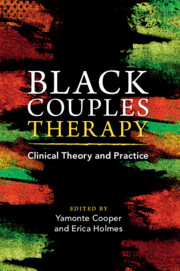Book contents
- Black Couples Therapy
- Black Couples Therapy
- Copyright page
- Contents
- Figures
- Tables
- Contributors
- Foreword
- Acknowledgments
- Introduction
- Part I Race, Racism, and Identity
- Part II Foundations for Healthy Coupling
- Part III Adapting Major Therapeutic Approaches for Work with African American Couples
- Part IV Sex and Intimacy
- Chapter 11 Sexual Intimacy in Black Heterosexual Couple Relationships: Challenges and Opportunities toward Relational Intimacy
- Chapter 12 Intimacy, Desire, and Sex in the African American Relationships
- Chapter 13 Wearing a Mask in Love: Implications for Covering and Infidelity in Black Relationships
- Part V Special Topics
- Index
- References
Chapter 13 - Wearing a Mask in Love: Implications for Covering and Infidelity in Black Relationships
from Part IV - Sex and Intimacy
Published online by Cambridge University Press: 27 July 2023
- Black Couples Therapy
- Black Couples Therapy
- Copyright page
- Contents
- Figures
- Tables
- Contributors
- Foreword
- Acknowledgments
- Introduction
- Part I Race, Racism, and Identity
- Part II Foundations for Healthy Coupling
- Part III Adapting Major Therapeutic Approaches for Work with African American Couples
- Part IV Sex and Intimacy
- Chapter 11 Sexual Intimacy in Black Heterosexual Couple Relationships: Challenges and Opportunities toward Relational Intimacy
- Chapter 12 Intimacy, Desire, and Sex in the African American Relationships
- Chapter 13 Wearing a Mask in Love: Implications for Covering and Infidelity in Black Relationships
- Part V Special Topics
- Index
- References
Summary
This chapter explores infidelity in Black committed relationships. Research indicates that the instability of Black relationships is directly related to the effects of racial trauma that Black men and women continue to endure. Due to the emotional and psychological wounds caused by systemic oppression, internalized stereotypes, and other factors, Black men and women often wear a mask, ultimately suppressing their authentic selves. A sociological phenomenon called covering is discussed to frame, expand, and make meaning of the ways Black men and women in relationship have learned to survive and protect themselves from further emotional bruising. A case study using Narrative Therapy addresses covering while attending to the language used to shape a couple’s reality. Discovering an alternative solution to other possibilities expands the couple’s sense of self and other to ultimately redefine their story.
Keywords
- Type
- Chapter
- Information
- Black Couples TherapyClinical Theory and Practice, pp. 293 - 316Publisher: Cambridge University PressPrint publication year: 2023

